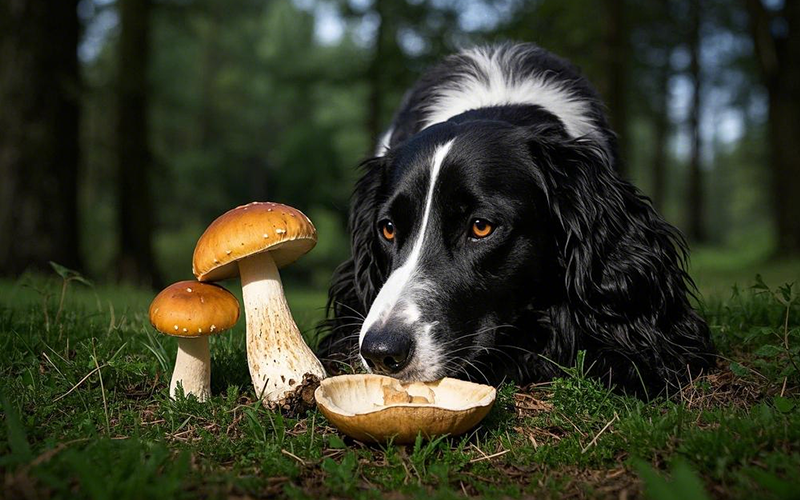Can Dogs Eat Mushrooms? A Comprehensive Guide to Pet Safety and Health
- 21 Mar 2025 09:40
Mushrooms are a popular food in many households, but when it comes to sharing them with our pets, particularly dogs, it’s essential to understand the risks. 🍄 Many pet owners wonder, "Can dogs eat mushrooms?" In this guide, we’ll explore the different types of mushrooms, the potential risks they pose to dogs, and how you can ensure your furry friend stays safe. 🐕🐾

What Are Mushrooms and Why Should You Care?
Mushrooms are fungi that grow in a variety of environments. While some types of mushrooms are safe for human consumption, others can be toxic to animals, including dogs. Knowing the difference is crucial for preventing potential poisoning.
Not all mushrooms are created equal, and some varieties can cause serious health problems for dogs. Whether wild or store-bought, you should be cautious when offering mushrooms to your pet.
Can Dogs Eat Mushrooms from the Store?
If you’re wondering whether you can give your dog store-bought mushrooms, the answer is, in general, yes, but with caution. Common varieties such as white button mushrooms or cremini mushrooms are non-toxic to dogs when cooked properly. 🌱 However, even these should be given in moderation, as eating too many can lead to digestive upset or other health issues.
Note: Avoid giving your dog mushrooms that have been seasoned or cooked with harmful ingredients like garlic, onions, or butter. These can be toxic to dogs. Keep it simple and safe! 🧑🍳🍄
The Danger of Wild Mushrooms 🌳🍄
Wild mushrooms, on the other hand, are a different story. While some wild mushrooms are harmless, many are toxic to dogs and can lead to severe health consequences, including liver damage, kidney failure, and even death in extreme cases. ⚠️
Dogs are naturally curious and may ingest mushrooms they find outdoors. It’s essential to keep an eye on your pet during walks, especially in areas where wild mushrooms are common. If you suspect your dog has eaten a wild mushroom, contact a pet health professional immediately for guidance. 🚨
Symptoms of Mushroom Poisoning in Dogs
If your dog consumes a toxic mushroom, it may exhibit several symptoms. These can include:
Vomiting 🤢
Diarrhea 💩
Drooling excessively 😓
Lethargy 😴
Loss of appetite 🐾
Seizures or tremors in severe cases 😟
If you notice any of these symptoms, it's vital to seek help as soon as possible. Delaying treatment can make the situation worse. The sooner you address the problem, the better the chances of a full recovery. 🏥
What to Do if Your Dog Eats a Toxic Mushroom
If you think your dog has ingested a toxic mushroom, do not wait for symptoms to appear. Contact a pet health professional immediately for advice on what to do next. They may recommend inducing vomiting or bringing your dog in for an examination and treatment.
In such cases, having a reliable pet health assistant like PettureX can be incredibly helpful. PettureX offers 24-hour online consultations and has the capability to recognize pet images, helping you identify potential dangers like toxic mushrooms more efficiently. 📱💡
Should You Ever Give Your Dog Mushrooms?
In conclusion, while it is generally safe for dogs to eat certain types of mushrooms, you should always exercise caution. Stick to store-bought, safe varieties and avoid wild mushrooms completely. Always remove any seasonings or harmful ingredients that could make the mushrooms toxic to your dog. 🦴
If your dog enjoys the taste of mushrooms, consider offering a small amount occasionally as a treat. Just remember, moderation is key to keeping your furry friend safe and healthy! 🐶❤️
Why Choose PettureX for Pet Health?
For peace of mind, you can use PettureX, a cutting-edge pet AI software that can help you identify potential health hazards for your dog, including mushrooms and other foods. With PettureX, you can get instant 24-hour online consultations and accurate pet image recognition, ensuring you stay informed and keep your pet’s health in check. 🌟
By using PettureX, you’re not just safeguarding your dog from harmful foods like mushrooms—you’re taking control of your pet's overall health with the help of technology. 🖥️🐾
In short, always be mindful of what your dog eats and never take risks with their safety. Keep them happy, healthy, and safe with a little help from PettureX! 🐕🎉
Related

Crunchy Curiosity: Can Dogs Safely Snack on Pork Rinds? A Deep Dive
- 21 Apr 2025
Pomegranate Seeds and Pooches: A Deep Dive into Whether Dogs Can Safely Indulge
- 21 Apr 2025
Can Dogs Eat Peaches? Vet Explains Benefits, Cyanide Risks & Safe Serving
- 16 Apr 2025
Can Dogs Eat Mulberries? Vet Explains Safety, Benefits & Potential Risks
- 16 Apr 2025
Can Dogs Eat Mozzarella? Vet Explains the Cheesy Truth (Risks & Benefits)
- 16 Apr 2025
Can Dogs Eat Mango Skin? Vet Explains Why It's a Risky Chew!
- 16 Apr 2025
Can Dogs Eat Maple Syrup? The Sugary Truth & Why Vets Advise Against It
- 16 Apr 2025
Can Dogs Eat Mac n Cheese? Vet Explains Why This Comfort Food Is Unsafe!
- 16 Apr 2025
Can Dogs Eat Liver? Vet Guide to This Nutrient-Dense Organ Meat (Benefits & Risks!)
- 16 Apr 2025
Can Dogs Eat Licorice? The Sweet Danger & Glycyrrhizin Risk Explained by Vets
- 16 Apr 2025
